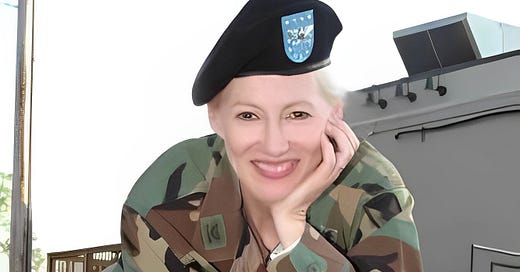Retired Col. Renita Menyhert, shown during her days as a military journalist, will be the featured speaker at this month’s Books For Lunch. The series focuses on local authors and will be held noon to 1 p.m. May 10 in the Temple Public Library board room. Bring your own lunch; drinks will be provided. Courtesy photo
DAVID STONE | OUR TOWN TEMPLE
As a military journalist and radio broadcaster, retired US Army Col. Renita Menyhert has told the stories of Cold War-era troops stationed near Germany’s border with Czechoslovakia and famous battles involving American soldiers.
She also has written five books about military topics such as Pearl Harbor, the Berlin Airlift and famed war correspondent Ernie Pyle.
“I joined the Army in 1976 as a broadcast journalist for the Armed Forces Network,’ Menyhert said this week. “I mainly wrote and broadcast feature stories about Army life in Tokyo and in Germany.”
The Dallas native found great success with the Armed Forces Network — winning 15 broadcast and journalism awards and being named best feature writer in the Army Materiel Command for eight straight years. She also won four first-place awards in the Department of the Army and two in the Department of Defense for her broadcast and print work. But, journalism wasn’t always in Menyhert’s plan.
“I was a theater major at Texas Woman’s University,” she said with a laugh. “I began having doubts about my major just before I graduated, and a wonderful professor suggested that I stay another year and get my master’s in TV and radio broadcasting. I decided to do that, but it didn’t start until the fall, and I had already auditioned for a summer production at Black Hills Playhouse in South Dakota. I decided to go ahead and do the production then come back to school. South Dakota was a great experience.”
With one course to go to complete her master’s Menyhert decided to apply to the Army Women’s Corp — a friend had been accepted and it sounded like a good opportunity.
“I applied,” Menyhert said. “If you were accepted, you automatically went in as a second lieutenant. Well, I was accepted and spent 11 weeks of basic training, then was hired to manage a military radio station in Tokyo.”
“I had some experience working at a station during college,” she said. “It was an acid rock station, and all the men had long hair. I dressed up and had a great learning experience.”
“Working at the station in Tokyo was an 8 to 4 kind of job. But then I was sent to Germany, and it was a different ball game. I was assigned to an Army division and I started writing with a focus on soldiers and their missions.”
Menyhert would be escorted to Germany’s border with Russian-occupied Czechoslovakia during the Cold War to interview US troops.
“The border had huge guard towers and huge guard dogs,” she said. “It was very intimidating.”
“A lot of the US soldiers I talked to were no more than 17 or 18 years old, but instead of going to dances and football games, they were putting their lives on the line on a daily basis. I did interviews and heard their remarkable stories. They were very nice to me, but of course they hadn’t seen a woman in God knows when. That’s probably why they were so nice.”
“We wanted to get them listening to our radio station, so we found out what kinds of music they liked so we could play it. I think music helped them cope with what was going on with the Cold War. I made trips to the border monthly.”
“I did features on the soldiers and on military hardware such as tanks, artillery and guns. The tank crews would name their tanks — my favorite was Big Burrito.”
“I mostly did individual interviews because group interviews rarely worked, but I wanted to try something for Mother’s Day,” she recalls. “I requested a meeting with 30 soldiers from a tank battalion and my request was granted. The commanding officers even agreed not to fire tanks during the interviews. I had each soldier talk about their mother and what they missed about them.”
“I wasn’t sure how the piece was going to turn out, but I edited the interviews and put an instrumental of Bob Hope’s Thanks for the Memories behind it. When it was finished, the station crew gathered to listen. About 20 seconds after it started, we were all reaching for a handkerchief — it was very heartwarming and touching. It was a very diverse group of soldiers from every corner of the US, but they said things about their moms that everyone could relate to.”
“The soldiers there loved to show off what they do,” she said. “They let me fire machine guns, a tank and even some heavy artillery. Again, they hadn’t seen a woman in a long time.”
Menyhert conducted hundreds, maybe thousands, of interviews with soldiers over the years, but several of the stories stuck with her.
“I was with a maintenance company that supported one of the battalions,” she said, “and I went to the main office to talk to the man in charge. He had numerous awards on his wall, along with a framed dishonorable discharge certificate.”
“Like many soldiers, the man had joined the Army looking for stability,” she said. “He had found that in the Army. He advanced to the rank of sergeant first class — he did it in three years, it usually takes a career to achieve that rank. At some point, he got married, realized he had made a mistake, then got the marriage annulled. He received extra pay after he was married, and he didn’t report that the marriage had ended. Eventually the man was charged with fraud and his rank was reduced. He also spent two years behind bars at Leavenworth.”
“At the end of his sentence, the Army offered him a second chance and put him in a retraining brigade as a private. Three years later, he advanced back to the sergeant first class rank.”
After returning to US soil, Menyhert began making trips with veterans who returned to European battle grounds. On one trip, she learned the story of a US paratrooper who landed in a battle zone in France.
“He was a medic, and he landed near a church where a battle had been fought. There were wounded soldiers all around the church, and as a medic he began treating them. He didn’t care what side they were on, he just saw injured people and helped them. There were Americans and Germans side-by-side on the floor of the church, and treated them for three days.”
During her working years, Menyhert worked for post newspapers and had stories published in publications such as Soldier’s Magazine. She has written about conflicts ranging from World War II to Vietnam to wars in Iraq and Afghanistan, all with an emphasis on human interest.
Menyhert is the author of five books, including Ernie Pyle Was My Hero, Remember Pearl Harbor, Operation Vittles: Stories from the Berlin Airlift, The Latest Generation and Army Life: Up Close and Personal.
The Belton resident will be the featured speaker at the next Books for Lunch meeting, which is noon to 1 p.m. on May 10 in the Temple Public Library Board Room. Guests are welcome to bring their lunch; drinks will be provided.
Books for Lunch is a monthly book program jointly sponsored by Temple Public Library and the Temple Literacy Council.












